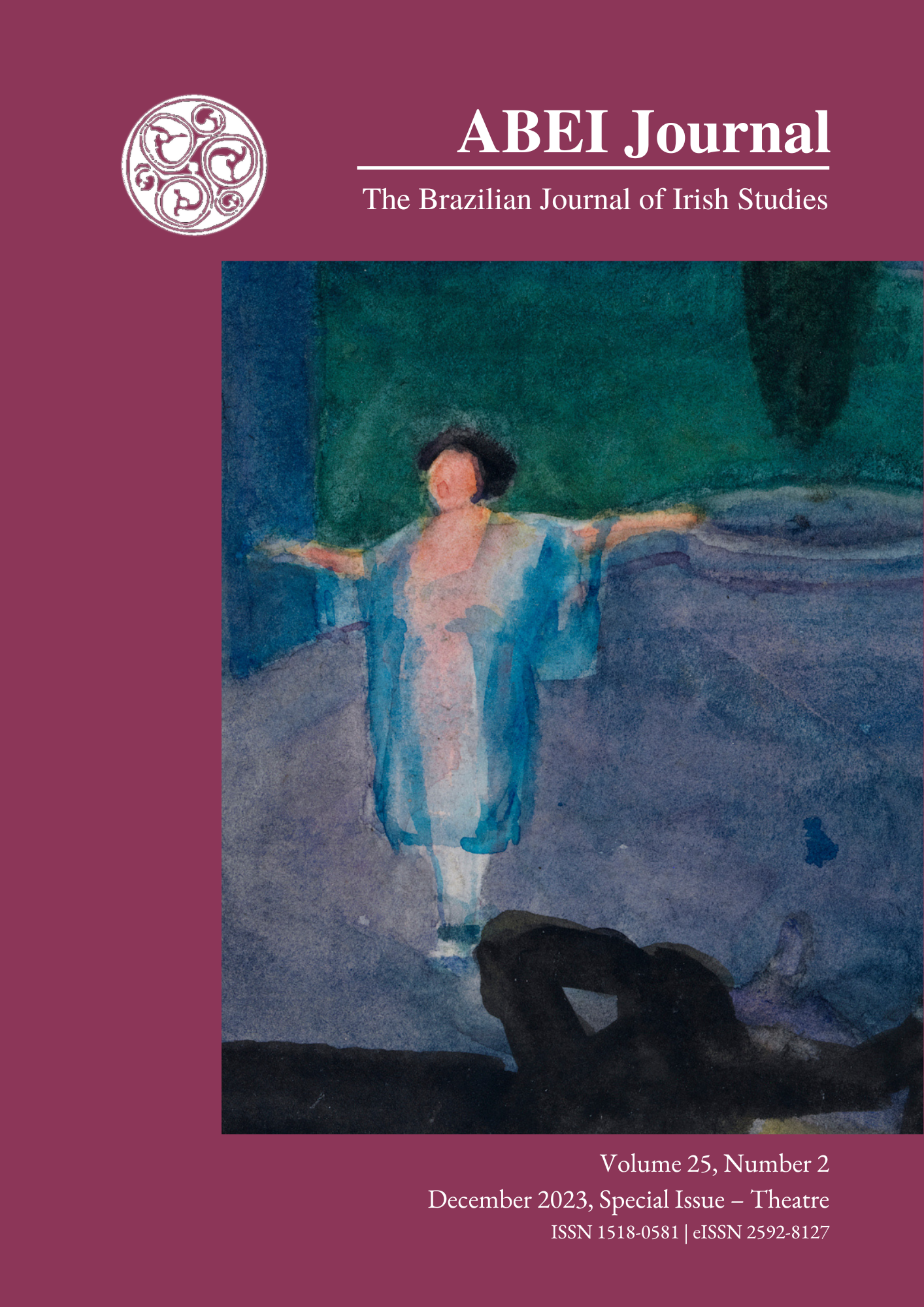Monológo, mulher e sobrevivência em Baglady de Frank McGuinness
DOI:
https://doi.org/10.11606/issn.2595-8127.v25i2p75-86Palavras-chave:
Frank McGuiness, Baglady, Monólogo, Trauma, CuraResumo
Embora seja verdade que as mulheres tenham recebido muita atenção desde meados do século XX e que algumas tenham ocupado cargos importantes em domínios públicos, não são muitas as obras teatrais que dão destaque total às mulheres em suas experiências menos perceptíveis, especialmente aquelas que são desfavorecidas ou que lutam à margem da sociedade. Nas obras que de fato o fazem, as descrições das condições das mulheres nem sempre refletem suas experiências e desafios exatos. Este artigo explorará a peça Baglady (1985), de Frank McGuiness, centrada em uma protagonista que revela suas memórias dolorosas e tenta lidar com seu sofrimento. Nessa peça, a protagonista, presa ao passado, revela seus segredos obscuros em uma narrativa que nem sempre está em uma sequência temporal regular. Aliás, ao ouvir como ela dá sentido a seus problemas na vida cotidiana, o público parece participar do processo de seu autoexame e possível cura. Este ensaio também investigará como a personagem luta contra a opressão de maneiras mais radicais e como ela falha ou consegue se libertar de suas restrições ocultas.
Referências
Adams, Rachel. “Michel Foucault: Discourse.” Critical Legal Thinking: Law and The Political. 10 Oct. 2022. <https://is.gd/DzhqHZ>
Bradby, David. “Monologues on the French Stage in the 1980s & 1990s: Theatres of the self.” Monologues: Theatre, Performance, Subjectivity. Ed. Clare Wallace. Prague: Litteraria Pragensia, 2006. 40-65.
Benstock, Shari. “The Transformational Grammar of Gender in Beckett’s Dramas.” Women in Beckett: Performance and Critical Perspectives. Ed. Linda Ben-Zvi. Chicago: University of Illinois Press, 1992. 172-86.
Geis, Deborah. Postmodern Theatric(k)s: Monologue in Contemporary Americana Drama. Ann Arbor: University of Michigan Press, 1993.
Jordan, Eamonn. “Look Who’s Talking, Too: The Duplicitous Myth of Naïve Narrative.” Monologues: Theatre, Performance, Subjectivity. Ed. Clare Wallace. Prague: Litteraria Pragensia, 2006. 125-156.
Lojek, Helen Heusner. Contexts for Frank McGuinness’s Drama. Washington, D.C.: The Catholic University of America Press, 2004.
McGuinness, Frank. Plays One. London: Faber & Faber, 1996.
Mikami, Hiroko. Frank McGuinness and His Theatre of Paradox. Gerrards Cross: Colin Smythe, 2002.
Nally, Kenneth. “Celebrating Confusion”: The Theatre of Frank McGuinness. Newcastle upon Tyne: Cambridge Scholars, 2009.
Raab, Michael. “A Nation of Soliloquists? The Irish and the Dramatic Monologue.” Ireland in Drama, Film and Popular Culture. Eds. Sandra Mayer, Julia Novak, and Margarete Rubik. Trier: WVT Wissenschaftlicher Verlag Trier, 2012. 15-20.
Singleton, Brian. “‘Am I Talking to Myself?’ Men, Masculinities and the Monologue in Contemporary Irish Theatre.” Monologues: Theatre, Performance, Subjectivity. Ed. Clare Wallace. Prague: Litteraria Pragensia, 2006. 278-296.
- - -. Masculinities and the Contemporary Irish Theatre. New York: Palgrave Macmillan, 2011.
Wallace, Clare. “Monologue Theatre, Solo Performance and Self as Spectacle.” Monologues: Theatre, Performance, Subjectivity. Ed. Wallace. Prague: Litteraria Pragensia, 2006. 1-16.
Weaver, Jesse. “Baglady by Frank McGuinness.” Irish Theatre Magazine. 9 August 2010. <http://itmarchive.ie/web/Reviews/Current/Baglady.aspx.html>.
Weber, Bruce. “On Stage and Off.” New York Times 26 February 2003: C2.
Downloads
Publicado
Edição
Seção
Licença
Direitos autorais (c) 2023 Wei H. Kao

Este trabalho está licenciado sob uma licença Creative Commons Attribution-NonCommercial 4.0 International License.


